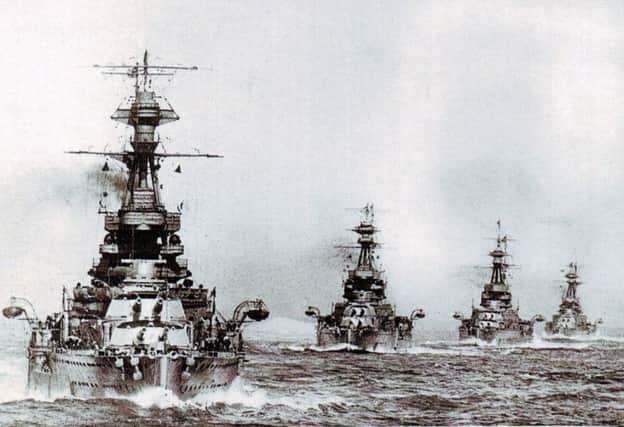'˜Every man did his best'


As the British and German navies prepared for battle, David’s grandfather, Mr William Henry Cunnigham, was serving on board the battleship HMS Agincourt.
David takes up the story just as Agincourt was being attached to the 6th Division of the 1st Battle Squadron.
Advertisement
Hide AdAdvertisement
Hide Ad“Her sisters in that division were HMS Hercules, HMS Revenge and the Division flagship HMS Marlbourgh,” explains David.
“William was very nervous and apprehensive about the forthcoming battle, and the thought crossed his mind that it may be just another false alarm.
“He was, however, supremely confident in his own ability and that of his crewmates and officers. He was especially very confident in the ability of Admiral Jellicoe, to whom he often talked to me about in adoration.”
William’s action station was in B turret, part of the main armament of seven main turrets of two 12” guns each.
Advertisement
Hide AdAdvertisement
Hide AdThey were on the ship’s centre line, consisting of two forward, two midships and three astern. The turrets were named after the days of the week.
The ship also had a number of smaller six inch guns for defence against enemy destroyers.
“Late in the afternoon, on May 31, 1916, whilst the Grand Fleet was heading south, off the coast of Jutland to rendezvous with Admiral Beatty’s Battlecruiser Fleet, who had earlier in the afternoon been engaged with elements of the German High Seas Fleet and had suffered heavy losses, they came upon their opposite numbers in the German High Seas Fleet, who were pursuing Beatty’s battlecruisers heading north.
“William, who was a gun layer in B turret was very deliberate, and concentrated a little more than normal with his duties that day, and when orders were given to open fire, the anxiety and apprehension seemed to disappear.
Advertisement
Hide AdAdvertisement
Hide Ad“When the gun breeches were opened, the fumes and smoke stung his eyes and throat, and empty shell casing littered the gun chamber.
“He said men were shouting,swearing and generally finding it difficult to hear, but every one of them did their jobs to the best of their ability.
“When the order came to cease fire, a great sense of relief overcame William and he, like the other men, felt exhausted and relived, but on constant alert because they didn’t know if the battle had ended.
“During the forenoon of June 1, it became apparent that the battle had ended and that mopping up operations were to be carried out by smaller units of the Royal Navy, and so the larger units of the Grand Fleet headed back to Scapa Flow, which they reached the following day.
Advertisement
Hide AdAdvertisement
Hide Ad“My grandfather was a very humble man, I suppose like a lot of men back then, but he was always proud of having served in the RoyalNavy and very honoured to have served with the men he did, and always spoke very highly of them.
“He is thankful that he didn’t serve in the trenches during the Great War, he always told me that those men were the real heroes.”
In 1918, William married his childhood sweetheart, and they had two children, David’s mother Audrey Helen and his uncle Houghton.
Between the wars he went back to work at Whitburn Colliery. He also worked for the LNER in Tyne Dock, South Shields.
Advertisement
Hide AdAdvertisement
Hide Ad“In 1938 he joined the T/A and was in the 4th Battalion Royal Northumberland Fusiliers. When war broke out his Battalion was part of the BEF and he was evacuated from Dunkirk in June of 1940. When he got back to England he was transferred to the 5th Royal Northumberland fusiliers and spent the rest of the war on home defence duty. He was demobbed in 1946, and went back to work as a coal miner until he retired. Sadly he passed away in June of 1973, and his wife Nora, my grandmother passed away in October 1976.
“My grandfather loved sport, and he played football for both the Agincourt and the Royal Navy. When I was young he often took me to watch local cricket and football teams.A very smart and humble man, he is of a generation we will not see again and I think we will be poorer for it.
“As a foot note, my mother Audrey Helen Hickman served in the RAF between 1941 and 1949, while my uncle was in a reserved occupation during the Second World War, while I served in the Royal Navy between 1970 and 1976.”